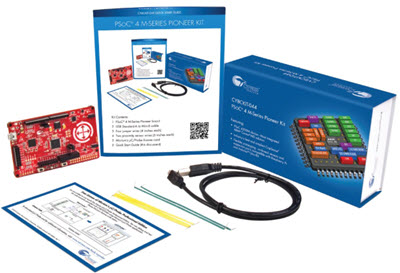|
For novel ideas about building embedded systems (both hardware and firmware), join the 35,000 engineers who subscribe to The Embedded Muse, a free biweekly newsletter. The Muse has no hype and no vendor PR. Click here to subscribe.

|
This month's giveaway is a Cypress CY8KIT-044 PSoC 4 M-series Pioneer kit. Enter here. |
|
Heathkit Shutters
Summary: Heathkit was coming back. Now it appears they're folding.
Last September I relayed a story that Heathkit, the purveyor of electronic kits so beloved by generations of old-timers, was getting back in the kit business (http://www.eetimes.com/discussion/break-points/4219631/Heathkit-returns-). After a couple of decades away from kits, selling only educational products, their web site announced (as it still does today) that kits were coming back. That article elicited lot of enthusiasm for the new products, as well as a ton of nostalgia for their kits of yore. Many readers shared stories of how Heath's products got them started in electronics.
Now, sadly, according to the ARRL (http://www.arrl.org/news/heathkit-educational-systems-closes-up-shop) Heathkit is closing shop.
Heath wasn't the only company pushing electronic kits back in the day; however, they were by far the most well-known, and their assembly manuals were second to none. Even a non-techie could build a TV or other device by following the meticulous instructions. This often created a "sense" of electronics; a sort of digital (meaning, in-the-fingers, not binary) familiarity with the mysteries behind a front panel. Alas, I fear that sort of shadetree-mechanic-like competence is in general fading today. Systems are so complex, and the electronics so inaccessible (think SMT and gigantic IC packages) that the average Joe has lost all sense of how things work.
That's not to say homebrewing is history. A lot of companies provide kits even today. Others offer boards and other components that an eager experimenter can use with relative ease. Think Arduino. Or www.sparkfun.com, or www.parallax.com, www.elenco.com, and, no doubt, scores of others. Then there's Club Jameco (http://www.clubjameco.com/), which markets kits created by individual engineers (though the web site is pretty unimpressive). I encourage readers to post their favorite contemporary sources of home experimenters' kits and the like.
As I write this, Heathkit's site lists the most superficial of information about kits they had planned to offer. Under audio components the site reads: "For those that want the pure sound from tubes with the latest technology." Tubes! What an anachronism! But what fun. It's true that some audiophiles prefer what's called the "warm" sound of vacuum tube amplifiers over semiconductor versions. Too much rock-n-roll decades ago left my hearing unable to detect any difference. But tube projects were easy to build, generally using point-to-point wiring with a process node closer to an inch or so compared with today's 22 nm geometry. One could troubleshoot these systems with just a VOM, though the 300 volt plate supply was painful and daunting.
For many of us Heath's announcement almost a year ago of rebuilding their kit business was a hopeful sign; alas, it's not to be.
Published May 18, 2012

